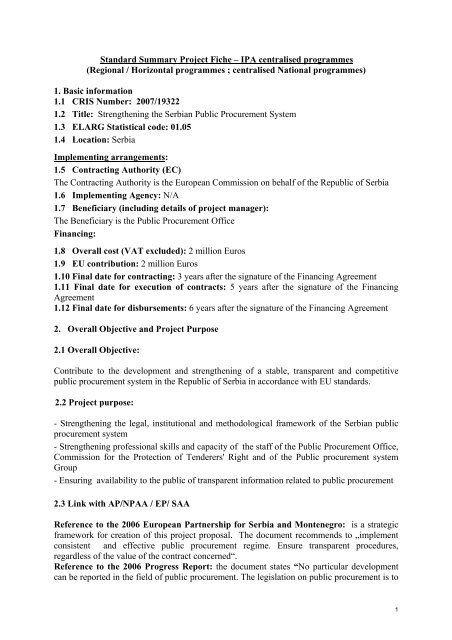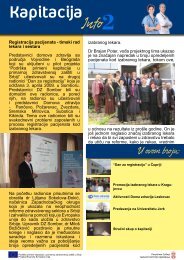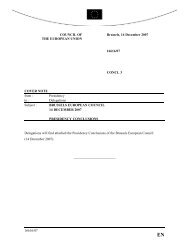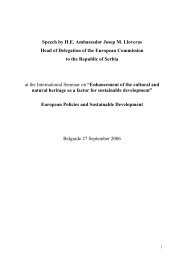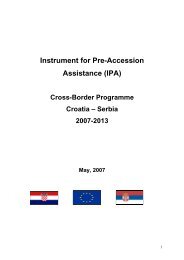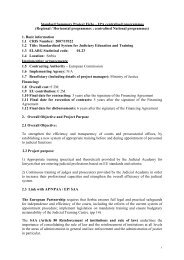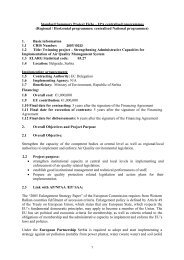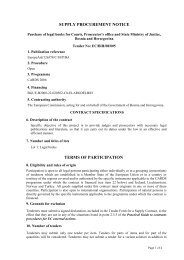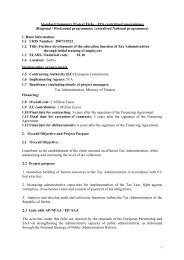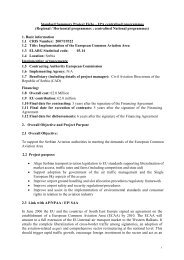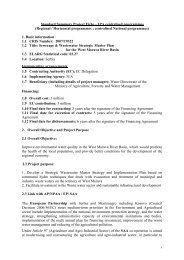Public Procurement Office pdf
Public Procurement Office pdf
Public Procurement Office pdf
Create successful ePaper yourself
Turn your PDF publications into a flip-book with our unique Google optimized e-Paper software.
Standard Summary Project Fiche – IPA centralised programmes<br />
(Regional / Horizontal programmes ; centralised National programmes)<br />
1. Basic information<br />
1.1 CRIS Number: 2007/19322<br />
1.2 Title: Strengthening the Serbian <strong>Public</strong> <strong>Procurement</strong> System<br />
1.3 ELARG Statistical code: 01.05<br />
1.4 Location: Serbia<br />
Implementing arrangements:<br />
1.5 Contracting Authority (EC)<br />
The Contracting Authority is the European Commission on behalf of the Republic of Serbia<br />
1.6 Implementing Agency: N/A<br />
1.7 Beneficiary (including details of project manager):<br />
The Beneficiary is the <strong>Public</strong> <strong>Procurement</strong> <strong>Office</strong><br />
Financing:<br />
1.8 Overall cost (VAT excluded): 2 million Euros<br />
1.9 EU contribution: 2 million Euros<br />
1.10 Final date for contracting: 3 years after the signature of the Financing Agreement<br />
1.11 Final date for execution of contracts: 5 years after the signature of the Financing<br />
Agreement<br />
1.12 Final date for disbursements: 6 years after the signature of the Financing Agreement<br />
2. Overall Objective and Project Purpose<br />
2.1 Overall Objective:<br />
Contribute to the development and strengthening of a stable, transparent and competitive<br />
public procurement system in the Republic of Serbia in accordance with EU standards.<br />
2.2 Project purpose:<br />
- Strengthening the legal, institutional and methodological framework of the Serbian public<br />
procurement system<br />
- Strengthening professional skills and capacity of the staff of the <strong>Public</strong> <strong>Procurement</strong> <strong>Office</strong>,<br />
Commission for the Protection of Tenderers' Right and of the <strong>Public</strong> procurement system<br />
Group<br />
- Ensuring availability to the public of transparent information related to public procurement<br />
2.3 Link with AP/NPAA / EP/ SAA<br />
Reference to the 2006 European Partnership for Serbia and Montenegro: is a strategic<br />
framework for creation of this project proposal. Тhe document recommends to „implement<br />
consistent and effective public procurement regime. Ensure transparent procedures,<br />
regardless of the value of the contract concerned“.<br />
Reference to the 2006 Progress Report: the document states “No particular development<br />
can be reported in the field of public procurement. The legislation on public procurement is to<br />
1
a large extent based on the Community acquis. However, the implementation of a consistent,<br />
non-discriminatory and effective public procurement system was halted pending the adoption<br />
of a new <strong>Public</strong> <strong>Procurement</strong> Law. Further efforts are needed in strengthening the<br />
implementation capacity of the <strong>Public</strong> <strong>Procurement</strong> <strong>Office</strong> and the <strong>Public</strong> <strong>Procurement</strong><br />
Commission, by increasing their independence vis-à-vis the Government and ensuring<br />
transparency in decision-making. Preparations for alignment with the acquis in this area have<br />
been launched. Overall, Serbia's preparation is relatively well advanced in the area of public<br />
procurement.<br />
National Strategy of Republic of Serbia for SCG's EU Accession represents the basic<br />
national document, which defines mid-term framework for strategic development in this area.<br />
As it was indicated in the Strategy, „...The area of public procurement is especially important<br />
as its functioning affects the relations between the state and the economic sector, and<br />
influences proper use of the budget, the economic development of the Republic of Serbia, as<br />
well as other, non-economic parameters such as fight against corruption. Regulation of public<br />
procurement in the European Union has a significant role in the forming of common market<br />
with equal terms of participation for all interested economic entities in the European<br />
Union…”<br />
In the Action Plan for Strengthening of Institutional Capacity for Taking Over the<br />
Obligations in the Process of European Integration 4 recommendations for the public<br />
procurement sector have been made: 1) Strengthen the capacities of the <strong>Public</strong> <strong>Procurement</strong><br />
<strong>Office</strong> , 2) Strengthen the capacities of the Commission for the Protection of Tenderers’<br />
Rights and provide its autonomy, 3) Establishment of Supreme Audit Institution, 4)<br />
Strengthen the capacities of the Budget Inspectorate and the Ministry of Internal Affairs in<br />
the field of public procurement<br />
<strong>Public</strong> <strong>Procurement</strong> <strong>Office</strong> has also produced the document called”Baseline of Strategy for<br />
Upgrading the <strong>Public</strong> <strong>Procurement</strong> System in Serbia”, which defines basic components of<br />
public procurement system reform.<br />
The National Anti-corruption Strategy which was adopted by the Serbian Parliament gives<br />
the following recommendations regarding the public procurement sector:<br />
1) Enhancing and strict implementation of legislation in the field of public procurement, 2)<br />
creation of an efficient control mechanism for monitoring of justification of planned public<br />
procurement, 3) creation of a control mechanism for realization of public procurement and 4)<br />
Providing the Commission for the Protection of Tenderers’ Rights the autonomy and<br />
independence of from the executive power.<br />
The draft text of Stabilisation and Association Agreement (Article 81, item 7) emphasizes<br />
the importance of public procurement:“… Serbia shall report annually to the Stabilisation and<br />
Association Council on the measures they have taken to enhance transparency and to provide<br />
for effective judicial review of decisions taken in the area of public procurement.”<br />
2.4 Link with MIPD<br />
MIPD states: “Supporting the development of sectoral strategies and policies compatible with<br />
EC internal market legislation and best practices in areas such as public procurement” is an<br />
area where EC assistance may be provided.<br />
2
2.5 Link with National Development Plan (where applicable)<br />
N/A<br />
2.6 Link with national/ sectoral investment plans(where applicable)<br />
N/A<br />
3. Description of project<br />
3.1 Background and justification:<br />
Existing <strong>Public</strong> <strong>Procurement</strong> Law (PPL) was adopted by Parliament on July 4 2002 and came<br />
into force on 13 July 2002. Although it was a good basis for the initial steps in the Serbian<br />
<strong>Public</strong> <strong>Procurement</strong> system, the necessity of adoption of a new PPL is widely recognised.<br />
Having in mind the importance of public procurement for Serbian economy it is indispensable<br />
to strengthen the capacities of the three public institutions, which have the key role in creation<br />
of necessary preconditions for enhancing efficiency and transparency in usage of the tax<br />
payers money for public procurement as well as for raising of competitiveness and equality of<br />
bidders in the public procurement procedures. These institutions are: <strong>Public</strong> <strong>Procurement</strong><br />
<strong>Office</strong> (PPO), Commission for the Protection of Tenderers’ (which is officially part of PPO)<br />
and <strong>Public</strong> procurement system Group of the Ministry of Finance.<br />
The PPO was established under Article 18 of the <strong>Public</strong> <strong>Procurement</strong> Law (Official Gazette<br />
39/2002) as an independent governmental organization accountable directly to the Prime<br />
Minister. It started its operations on 15 January 2003. The PPO aims are to ensure that<br />
appropriate procedures are being followed for the efficient, effective and transparent use of<br />
public funds covering the supply of goods, works and services. In order to achieve these<br />
goals, the PPO promotes competition and equal treatment of all bidders.<br />
According to the PPL, the functions of the PPO are the following:<br />
- Draft regulations for adoption by the government;<br />
- Provide advisory services to contracting entities and tenderers;<br />
- Organise training in the area of public procurement;<br />
- Ensure international co-operation in the area of public procurement;<br />
- Publish notices and distribute handbooks and guidance information;<br />
- Prepare model tender documentation;<br />
- Collect statistical data from contracting entities;<br />
- Monitor public procurement;<br />
- Submit to the government an annual report on public procurement.<br />
However, the PPO faces the problem of weak human resource capacities. This is caused by<br />
the fact, that PPL inadequately defined duties and tasks which should be performed in the<br />
PPO. This imperfectness of PPL makes the derived concrete tasks and jobs rather difficult for<br />
direct administrators/employees in the PPO. The non-existence of some important institutions<br />
necessary for well-functioning of the PP system, (e.g. Supreme Audit Institution) makes the<br />
problem even more difficult.<br />
3
The primary objective of the Commission for the Protection of Tenderers' Right is to ensure<br />
the full legal security of all participants in the process of awarding public procurement<br />
contracts. The relevant national strategic documents recommend formal separation of the<br />
Commission from the structure of the PPO and its establishment as a separate authority. In<br />
relation with that, it should be mentioned that the Commission, as a part of the PPO, does not<br />
have its own budget, which substantially limited its functionality. In addition, according to the<br />
PPL, the CPR rules in the administrative proceedings initiated by the PPO even though<br />
institutionally the CPR is a part of the PPO. The CPR is using the premises of the PPO. Other<br />
issues question the actual independence of the CPR.<br />
The Commission has also a very limited time frame to take decisions (15 days) and this<br />
insufficient human/administrative capacity (12 employees) does not allow to rule within such<br />
a short delay. Furthermore, the Commission also depends very often on the<br />
opinion/information from other state organs which are not always quick in responding to the<br />
Commission’s questions and requests. That risk may have significant consequences as the<br />
decisions of the Commission are final with no possibility of appeal or any further<br />
proceedings.<br />
<strong>Public</strong> procurement system Group performs the tasks related to the drafting of the PPL and<br />
the by laws, as well as the interpretation of the provisions of the PPL.<br />
Main partners in the implementation of the project are: <strong>Public</strong> <strong>Procurement</strong> <strong>Office</strong>,<br />
Commission for Protection of Tenderers’ Rights, Ministry of Finance. It is also expected that<br />
the relevant Serbian Ministry in charge of IPA coordination should also participate in all<br />
activities related to the project. Having in mind its central coordinating role in the process of<br />
European integration the same is expected from the European Integration <strong>Office</strong> of the<br />
Serbian Government.<br />
The Sigma Balkan Report on <strong>Public</strong> <strong>Procurement</strong> in Serbia issued in June 2006 listed the<br />
following recommendations:<br />
“The government should take further steps to revise the PPL so that it is fully aligned with the<br />
EC Directives.<br />
Consideration should be given to the organisation of internal and external audit so as to<br />
ensure the integrity of the procurement processes.<br />
The government, in close consultation with all important stakeholders, should prepare a<br />
strategy and detailed action plan for the public procurement reform process, setting out clearly<br />
the needs and the measures to be taken.<br />
The PPO should be strengthened, in particular in terms of training, organisation and IT<br />
systems.<br />
The efficiency of the procurement system should be increased through initiatives to set up<br />
arrangements for co-ordinated and centralised purchasing, including the introduction of<br />
framework agreements.<br />
Preparations are required for the future use of electronic procurement. “<br />
The Study also considered that the PPO would definitely benefit from external assistance and<br />
from closer international co-operation in the following areas:<br />
4
- Review of the PPL to determine the need for further revisions, with a view to (i) achieving<br />
full alignment with the EC Directives, and (ii) introducing appropriate and efficient national<br />
procedures for contracts not covered by the Directives;<br />
- Support for the development of the operations of the PPO through the provision of training,<br />
experience-sharing with PPOs in other countries, and help with the preparation of operational<br />
guidelines and tender and contract documentation;<br />
- Support for the Review Commission and its operations;<br />
- Support in the preparation and conduct of a comprehensive training programme and<br />
information programme targeting purchasers at all levels, but in particular units at regional<br />
and local levels; an information programme should also be designed for the private sector;<br />
- Support for the introduction of modern techniques for tendering and contracting, such as<br />
electronic means and framework agreements.<br />
In the GRECO Report (Group of States against corruption, which functions within the<br />
Council of Europe) published on 9 of October 2006, there are 25 recommendations for Serbia.<br />
According to a GRECO recommendation it is necessary to improve the implementation of the<br />
PPL, particularly through the training of public officials, which participate in the public<br />
procurement process.<br />
3.2 Assessment of project impact, catalytic effect, sustainability and cross border impact<br />
(where applicable)<br />
The setting up of an efficient public procurement system is a fundamental element for the<br />
success of a market economy and it contributes to long-term economic growth, job-creation,<br />
the development of business and the emergence of a competitive market culture focused on<br />
business efficiency and on “best value for money” in regard to government spending. A wellrun<br />
public procurement system can secure considerable savings in public funds and therefore<br />
savings for taxpayers. Moreover, a modern and fully functioning system provides the added<br />
benefits of fairness and transparency and thus contributes to the reduction of corruption and<br />
the avoidance of the use of discrimination as disguised trade barrier.<br />
3.3 Results and measurable indicators:<br />
Expected results and measurable indicators for Component 1 (Strengthening the legal,<br />
institutional and methodological framework of the Serbian public procurement system):<br />
Expected results include:<br />
• Legal framework for public procurement is aligned with latest EU directives,<br />
including the general standard procedures requests and documents<br />
• Revised organisational charts with clear distribution of tasks and procedures are<br />
designed and implemented for PPO, the Commission for the Protection of Tenderers'<br />
Right and the <strong>Public</strong> <strong>Procurement</strong> System Group<br />
• Assigned roles and responsibilities of those involved in public procurement activities<br />
are designed precisely, clearly and without overlapping<br />
Measurable indicators for reviewing progress include:<br />
• Primary and secondary legislation adopted by Government and Parliament<br />
• Revised standard bidding documents<br />
5
• Manual (s) in CD-ROM format for procuring entities on tender preparation including<br />
supplies, services and works<br />
• Organisational Development plan including operational implementation plan for the<br />
PPO, the Commission for the Protection of Tenderers' Right and the <strong>Public</strong><br />
<strong>Procurement</strong> System Group<br />
• Revised organizational charts for the PPO, the Commission for the Protection of<br />
Tenderers' Right and the <strong>Public</strong> <strong>Procurement</strong> System Group<br />
• Guidelines on internal rules and procedures for the PPO, the Commission for the<br />
Protection of Tenderers' Right and the <strong>Public</strong> <strong>Procurement</strong> System Group.<br />
Expected results and measurable indicators for Component 2 (Strengthening professional<br />
skills and capacity of the staff of the <strong>Public</strong> <strong>Procurement</strong> <strong>Office</strong>, Commission for the<br />
Protection of Tenderers' Right of the <strong>Public</strong> procurement system Group and of procuring<br />
entities)<br />
Expected results include:<br />
• Improved skills concerning public procurement law and processes of PPO,<br />
Commission for the Protection of Tenderers' Right and <strong>Public</strong> <strong>Procurement</strong> System<br />
Group staff<br />
Measurable indicators for reviewing progress include:<br />
- number of trainings/workshops/study visits<br />
- number of staff trained<br />
- number of training/workshop/study visit feed back questionnaires sent back by<br />
participants<br />
Expected results and measurable indicators for Component 3 (Ensuring availability to the<br />
staff of the <strong>Public</strong> <strong>Procurement</strong> <strong>Office</strong>, Commission for the Protection of Tenderers' Right<br />
and of the <strong>Public</strong> procurement system Group and to the public of transparent information<br />
related to public procurement)<br />
Expected results include:<br />
• <strong>Public</strong> <strong>Procurement</strong> <strong>Office</strong>, Commission for the Protection of Tenderers' Right and<br />
<strong>Public</strong> procurement system Group are technically equipped to ensure reliable<br />
information access between themselves and towards the public<br />
• An improved and compatible communication flow system between the PPO and the<br />
contracting authorities is installed<br />
• An e-procurement system primarily used for transferring relevant information<br />
concerning public procurement to ТЕD (Tenders Electronic Daily) is set up<br />
• Information of bidders at all levels (national, regional and local) concerning<br />
procurement rules and processes is improved<br />
Measurable indicators for reviewing progress include:<br />
• Full list of equipment (hardware and software) is identified, tendered delivered and<br />
functional<br />
• Technical equipment for introduction of an electronic public procurement system<br />
(hardware and software) is installed.<br />
• Number of awareness raising events organised<br />
• Number of monthly/quarterly newsletters disseminated<br />
6
3.4 Activities:<br />
Activities foreseen for Component 1 (Strengthening the legal, institutional and<br />
methodological framework of the Serbian public procurement system):<br />
- Assist, in close coordination with PLAC III project, in drafting legislation, by laws and<br />
related procedures in line with EU directives and standards (emphasis on Directives<br />
2004/18/EC; 2005/51/EC, and remedies directives 89/665 and 92/13/EEC);<br />
- Assess the internal organizational chart and working procedures of the PPO, the<br />
Commission for Protection of Tenderers’ Rights and the <strong>Public</strong> <strong>Procurement</strong> System Group of<br />
the Ministry of Finance;<br />
- Prepare and implement proposals for further improvements (development plans) of the<br />
internal organizational structure, working procedures and their guidelines of the PPO, the<br />
Commission and the PPS Group;<br />
- Revise standard bidding documents;<br />
- Prepare manuals for bidding entities;<br />
Activities foreseen for Component 2 (Strengthening professional skills and capacity of<br />
the staff of the <strong>Public</strong> <strong>Procurement</strong> <strong>Office</strong>, Commission for the Protection of Tenderers'<br />
Right, of the <strong>Public</strong> procurement system Group and of procuring entities):<br />
- To carry out training needs analysis in PPO, Commission for the Protection of Tenderers'<br />
Right, <strong>Public</strong> procurement system Group and procuring entities concerning the public<br />
procurement process including e-procurement<br />
- To design training plan including study visits in PPOs in EU countries<br />
- To carry out trainings/workshops and study visits<br />
- To regularly update training and study visits needs<br />
Activities foreseen for Component 3 (Ensuring availability to the staff of the <strong>Public</strong><br />
<strong>Procurement</strong> <strong>Office</strong>, Commission for the Protection of Tenderers' Right and of the<br />
<strong>Public</strong> procurement system Group and to the public of transparent information related<br />
to public procurement):<br />
- To evaluate existing plans for establishing and installing of an electronic public procurement<br />
system compatible with EU standards.<br />
- To develop systems and methodologies for e-procurement that forms a part of e-government<br />
program, to set up such a system compatible with SIMAP and to establish a mechanism for<br />
monitoring and control of that IT system.<br />
- To set up internet-based publication systems of tenders and award notices, including the<br />
processing of notices, quality and legality controls of received notices, publication of notices,<br />
and submission of notices to TED<br />
7
- To design technical specifications for equipment (hardware, software) necessary for a<br />
functioning of public procurement information system including information flows between<br />
the PPO and the contracting authorities<br />
- To provide training for the use of the equipment purchased<br />
- To design, produce and disseminate brochures, handbooks and publications for raising<br />
awareness of all stakeholders about the regulations and procedures aligned with EU<br />
directives and practices<br />
- To set up a help-desk function at the PPO in order to provide legal professional support to<br />
purchasers and economic operators on a daily basis<br />
- To assist the drafting the “corruption map” identifying the main risk areas and practices of<br />
corruption in the area of public procurement, which should be relevant both for procuring<br />
entities and for the bidders<br />
- To draft and disseminate the Code of Ethics in the field of public procurement<br />
The activities will be implemented through a service and supply contract.<br />
3.5 Conditionality and sequencing:<br />
Existing legislation does not match completely the adequate criteria requested for<br />
implementation of the project. <strong>Public</strong> <strong>Procurement</strong> <strong>Office</strong>, Commission for Protection of<br />
Tenderers’ Rights and <strong>Public</strong> procurement system Group of the Ministry of Finance do not<br />
dispose with enough number of employees, which jeopardizes the project implementation.<br />
The project will not be supported unless all these preconditions for its implementation are<br />
fulfilled. Therefore, the Government needs to continue providing full support to the <strong>Public</strong><br />
<strong>Procurement</strong> <strong>Office</strong> and its activities, empower it by giving it more responsibilities and more<br />
staff.<br />
Activities focused on the reform of the public procurement system are related to the activities<br />
of the public administration reform with regards to human resources management,<br />
introduction of ICT in public administration (e-government) and modern administrative<br />
procedures that have a direct effect on realization of the project.<br />
3.6 Linked activities<br />
Since 2003, ЕU, ОSCE and other donors have supported different activities in public<br />
procurement sector.<br />
The project proposal is particularly related to:<br />
- The project “European Electronic <strong>Public</strong> <strong>Procurement</strong> Application Framework in the<br />
Western Balkan Region“(ЕLLECTRAWeB) started on 1 st January 2007 for a two-year<br />
period; its objective is to introduce practices of electronic public procurement. The<br />
project is 50 % financed by the European Commission.<br />
8
- The third phase of the CARDS project Policy and Legal Advisory Center due to start<br />
in June 2007 will have a specific component (PLAC) dedicated to assist in the revision<br />
of the current <strong>Public</strong> <strong>Procurement</strong> Law and its relevant by laws.<br />
- ОSCE project for the training of public officials engaged in public procurement<br />
affairs; first seminar was held in December 2006 and represented the first step in<br />
realization of the recommendations given in the Group of Countries for fight against<br />
corruption Report (GRECО) of the Council of Europe.<br />
- World Bank Country <strong>Procurement</strong> Assessment Review (CPAR) for 2002.<br />
- SIGMA Paper N o 40: Central <strong>Public</strong> <strong>Procurement</strong> Structures and capacity in the MS of<br />
the EU.<br />
Besides the bilateral cooperation with countries in the region of Western Balkans, PPO<br />
maintains regular cooperation with National Review Commission of the Republic of Slovenia.<br />
Exceptionally successful cooperation is also being maintained with the OSCE Mission to<br />
Serbia particularly as to the short-term engagement of foreign experts needed for scrutinizing<br />
of legal regulations’ provisions.<br />
3.7 Lessons learned<br />
Previous experiences show that it is necessary to invest significant efforts to make a full<br />
harmonization of the Serbian public procurement system with EU standards. In relation with<br />
that, it must be emphasized that the limited aid absorption capacity could be a significant<br />
limitation as to the reforms of the public procurement system. Reasons for such a situation<br />
are, inter alia, insufficient number of employees, limited knowledge on EU integration<br />
process, as well as non-existence of some inevitable institutions and regulations.<br />
4. Indicative Budget (amounts in €)<br />
TOTAL COST EU CONTRIBUTION<br />
SOURCES OF FUNDING<br />
NATIONAL PUBLIC<br />
CONTRIBUTION PRIVATE<br />
Activities 2.0 Million Total % * IB INV Total % * Central Regional IFIs Total % *<br />
Activity Component<br />
1,2,3- TA 1.5 1.5 75%<br />
contract 1.1<br />
Activity Component<br />
3 - Equipment 0.5 0.5 25%<br />
……<br />
contract 2.1<br />
TOTAL 2.0 2.0 100<br />
* expressed in % of the Total Cost<br />
9
5. Indicative Implementation Schedule (periods broken down per quarter) 1<br />
Contracts Start of Signature of Project<br />
Tendering contract Completion<br />
Contract 1.1 T+1Q T+2Q T+8Q<br />
Contract 1.2 T+1Q T+3Q T+10Q<br />
All projects should in principle be ready for tendering in the 1 ST Quarter following the<br />
signature of the FA<br />
6. Cross cutting issues (where applicable)<br />
Development Policy Joint Statement by the Council and the European Commission of 10<br />
November 2000 establishes that a number of Cross-cutting Issues shall be mainstreamed into<br />
EC development co-operation and assistance.<br />
Cross-cutting issues will be addressed in the project so as to comply with the best EU<br />
standards and practice in that area and in a way which demonstrates how they will be dealt<br />
with within the project’s framework, its activities and outputs.<br />
Cross-cutting issues will be addressed in a proactive manner, and will present a specific<br />
component of projects (at all levels of projects' development, starting from the project<br />
identification stage). Synergies between the projects and the objectives of will be identified<br />
and developed. Also, the projects’ objectives and activities need to be screened in order to<br />
ensure they won’t impact negatively on gender equality, minorities’ inclusion and<br />
environment.<br />
Finally, the beneficiary will make sure its objectives, policies and interventions have a<br />
positive impact on and are in line with the main principles of gender equality, minorities’<br />
inclusion and environment.<br />
6.1 Equal Opportunity<br />
Equal treatment and opportunities for women should be realised through provisions that take<br />
into account the working capacities and family obligations. In particular, curricula and<br />
delivery mechanism (place and time schedule) of training programmes for the staff should be<br />
thought of so as to favour women’s participation.<br />
6.2 Environment N/A<br />
6.3 Minorities N/A<br />
1 [where T=the date of the signature of the FA and xQ equals the number (x) of quarters (Q) following T].<br />
10
ANNEX I: Logical framework matrix in standard format<br />
LOGFRAME PLANNING MATRIX FOR Project Fiche Programme name and number<br />
•<br />
Contracting period expires 5 years after the<br />
signature of the Financing Agreement<br />
Total budget :<br />
EUR 2.0 Million<br />
Overall objective Objectively verifiable indicators Sources of Verification<br />
Contribute to the development and strengthening of a stable,<br />
transparent and competitive public procurement system in the<br />
Republic of Serbia in accordance with EU standards.<br />
Project purpose<br />
- Strengthening the legal, institutional and methodological<br />
framework of the Serbian public procurement system<br />
- Strengthening professional skills and capacity of the staff of<br />
the <strong>Public</strong> <strong>Procurement</strong> <strong>Office</strong>, Commission for the Protection<br />
of Tenderers' Right and of the <strong>Public</strong> procurement system<br />
Group<br />
- Ensuring availability to the public of transparent information<br />
related to public procurement<br />
Conclusion of SA Agreement Commission Progress reports<br />
Project documents<br />
Objectively verifiable indicators<br />
- Revised organisational charts of the beneficiaries<br />
- Legislation amended<br />
- Number of staff trained<br />
- Number of information dissemination events<br />
Sources of Verification Assumptions<br />
Strengthening the Serbian <strong>Public</strong><br />
<strong>Procurement</strong> System<br />
Disbursement period: expires 6 years after<br />
the signature of the Financing Agreement<br />
IPA budget: EUR 2.0 Million<br />
Project documents Adequate number of staff in the Beneficiary<br />
institutions<br />
Results Objectively verifiable indicators Sources of Verification Assumptions<br />
Component 1 (Strengthening the legal, institutional and<br />
methodological framework of the Serbian public procurement<br />
system):<br />
- Legal framework for public procurement is aligned with latest<br />
EU directives, including the general standard procedures<br />
requests and documents<br />
- Revised organisational charts with clear distribution of tasks<br />
and procedures are designed and implemented for PPO, the<br />
Commission for the Protection of Tenderers' Right and the<br />
<strong>Public</strong> <strong>Procurement</strong> System Group<br />
- Assigned roles and responsibilities of those involved in public<br />
procurement activities are designed precisely, clearly and<br />
without overlapping<br />
- Primary and secondary legislation adopted by Government and<br />
Parliament<br />
Revised standard bidding documents<br />
- Manual (s) in CD-ROM format for procuring entities on tender<br />
preparation including supplies, services and works<br />
-Organisational Development plan including operational<br />
implementation plan for the PPO, the Commission for the<br />
Protection of Tenderers' Right and the <strong>Public</strong> <strong>Procurement</strong> System<br />
Group<br />
- Revised organizational charts for the PPO, the Commission for<br />
the Protection of Tenderers' Right and the <strong>Public</strong> <strong>Procurement</strong><br />
System Group<br />
- Guidelines on internal rules and procedures for the PPO, the<br />
Commission for the Protection of Tenderers' Right and the <strong>Public</strong><br />
<strong>Procurement</strong> System Group.<br />
Commission Reports<br />
Project documents<br />
11
Component 2 (Strengthening professional skills and capacity of<br />
the staff of the <strong>Public</strong> <strong>Procurement</strong> <strong>Office</strong>, Commission for the<br />
Protection of Tenderers' Right of the <strong>Public</strong> procurement system<br />
Group and of procuring entities):<br />
- Improved skills concerning public procurement law and<br />
processes of PPO, Commission for the Protection of Tenderers'<br />
Right and <strong>Public</strong> <strong>Procurement</strong> System Group staff<br />
Component 3 (Ensuring availability to the staff of the <strong>Public</strong><br />
<strong>Procurement</strong> <strong>Office</strong>, Commission for the Protection of<br />
Tenderers' Right and of the <strong>Public</strong> procurement system Group<br />
and to the public of transparent information related to public<br />
procurement)<br />
- <strong>Public</strong> <strong>Procurement</strong> <strong>Office</strong>, Commission for the Protection of<br />
Tenderers' Right and <strong>Public</strong> procurement system Group are<br />
technically equipped to ensure reliable information access<br />
between themselves and towards the public<br />
- An improved and compatible communication flow system<br />
between the PPO and the contracting authorities is installed<br />
- An e-procurement system primarily used for transferring<br />
relevant information concerning public procurement to ТЕD<br />
(Tenders Electronic Daily) is set up<br />
- number of trainings/workshops/study visits<br />
- number of staff trained<br />
- number of training/workshop/study visit feed back questionnaires<br />
sent back by participants<br />
- Full list of equipment (hardware and software) is identified,<br />
tendered delivered and functional<br />
- Technical equipment for introduction of an electronic public<br />
procurement system (hardware and software) is installed.<br />
- Number of awareness raising events organised<br />
- Number of monthly/quarterly newsletters disseminated<br />
Project documents<br />
- Information of bidders at all levels (national, regional and<br />
local) concerning procurement rules and processes is improved<br />
Project documents<br />
Activities<br />
Component 1<br />
Means Costs Assumptions<br />
Technical assistance<br />
EUR 1.5 Million for Component 1,2 and 3<br />
- Assist, in close coordination with PLAC III project, in drafting<br />
(technical assistance)<br />
legislation, by laws and related procedures in line with EU<br />
directives and standards (emphasis on Directives 2004/18/EC;<br />
2005/51/EC, and remedies directives 89/665 and 92/13/EEC);<br />
EUR 0.5 Million for Component 3 (supplies)<br />
- Assess the internal organizational chart and working<br />
procedures of the PPO, the Commission for Protection of<br />
Tenderers’ Rights and the <strong>Public</strong> <strong>Procurement</strong> System Group of<br />
the Ministry of Finance;<br />
- Prepare and implement proposals for further improvements<br />
(development plans) of the internal organizational structure,<br />
working procedures and their guidelines of the PPO, the<br />
Commission and the PPS Group;<br />
- Revise standard bidding documents;<br />
- Prepare manuals for bidding entities;<br />
12
Component 2<br />
- To carry out training needs analysis in PPO, Commission for<br />
the Protection of Tenderers' Right, <strong>Public</strong> procurement system<br />
Group and procuring entities concerning the public procurement<br />
process including e-procurement<br />
- To design training plan including study visits in PPOs in EU<br />
countries<br />
- To carry out trainings/workshops and study visits<br />
- To regularly update training and study visits needs<br />
Component 3<br />
- To evaluate existing plans for establishing and installing of an<br />
electronic public procurement system compatible with EU<br />
standards.<br />
- To develop systems and methodologies for e-procurement that<br />
forms a part of e-government program, to set up such a system<br />
compatible with SIMAP and to establish a mechanism for<br />
monitoring and control of that IT system.<br />
- To set up internet-based publication systems of tenders and<br />
award notices, including the processing of notices, quality and<br />
legality controls of received notices, publication of notices, and<br />
submission of notices to TED<br />
- To design technical specifications for equipment (hardware,<br />
software) necessary for a functioning of public procurement<br />
information system including information flows between the<br />
PPO and the contracting authorities<br />
- To provide training for the use of the equipment purchased<br />
- To design, produce and disseminate brochures, handbooks and<br />
publications for raising awareness of all stakeholders about the<br />
regulations and procedures aligned with EU directives and<br />
practices<br />
- To set up a help-desk function at the PPO in order to provide<br />
legal professional support to purchasers and economic operators<br />
on a daily basis<br />
- To assist the drafting the “corruption map” identifying the main<br />
risk areas and practices of corruption in the area of public<br />
procurement, which should be relevant both for procuring<br />
entities and for the bidders<br />
13
- To draft and disseminate the Code of Ethics in the field of<br />
public procurement<br />
Technical assistance and supply contract<br />
Pre-conditions<br />
ANNEX II: amounts (in €) Contracted and disbursed by quarter for the project<br />
Contracted<br />
Contract 1.1<br />
Contract 1.2<br />
Contract 1.3<br />
Contract 1.4<br />
……<br />
1 st<br />
Q2009<br />
1.5 M<br />
2 nd Q<br />
2009<br />
3 rd Q<br />
2009<br />
0.5 M<br />
Cumulated 1.5M 2M<br />
Disbursed<br />
4 th Q<br />
2009<br />
Contract 1.1 0.3 M 0.35M 0.35M 0.35M 0.15M<br />
Contract 1.2<br />
Contract 1.3<br />
Contract 1.4<br />
……<br />
1 st Q<br />
2010<br />
2 nd Q<br />
2010<br />
3 rd Q<br />
2010<br />
4 th Q<br />
2010<br />
1 st Q<br />
2011<br />
0.3M 0.15M 0.05M<br />
Cumulated 0.3M 0.95 1.45M 1.8M 2M<br />
2 nd Q<br />
2011<br />
3 rd Q2011<br />
14
ANNEX III<br />
Description of Institutional Framework<br />
The <strong>Public</strong> <strong>Procurement</strong> <strong>Office</strong> is in charge of implementation and monitoring of this project. The <strong>Office</strong> falls under the competence of the<br />
Ministry of Finance. The work, mandate and authorisations of the Ministry are regulated by the Law on Ministries (adopted on May 15, 2007<br />
(Official Gazette of Republic of Serbia no. 48/07)) – i.e. Article 6. Organisational chart of the Ministry of Finance is given below.<br />
Independent executives Independent Inspector<br />
of Internal Control<br />
Tax<br />
Administration<br />
Tobacco<br />
Administration<br />
Macro-economic and Fiscal<br />
Analysis Department<br />
Customs System and<br />
Policy Department<br />
<strong>Public</strong> Debt<br />
Administration<br />
Administration for<br />
Money Laundering<br />
Prevention<br />
Budget Inspection and<br />
Audit Department<br />
Chamber of Appeals for<br />
Infractions Procedures<br />
Minister of Finance<br />
State Secretaries Secretariat<br />
Coordinator of <strong>Public</strong><br />
Administration Reforms<br />
Departments<br />
Treasury<br />
Administration<br />
Gaming<br />
Administration<br />
Customs<br />
Administration<br />
Foreign Currency<br />
Inspection<br />
Fiscal System Department Department for Property<br />
related Legal Affairs<br />
Department for International<br />
Financial Relations<br />
Project Management<br />
Department<br />
Free Zones<br />
Administration<br />
Finance System Department<br />
<strong>Public</strong> <strong>Procurement</strong><br />
System Group<br />
15
ANNEX IV<br />
Reference list of relevant laws and regulations<br />
Reference list of relevant laws and regulations in the area of training and public<br />
procurement<br />
General:<br />
- Constitution of the Republic of Serbia<br />
- Law for the Implementation of the Constitution of the Republic of Serbia<br />
- National Strategy for Serbia and Montenegro’s Accession to the European Union<br />
- Action Plan for the Implementation of the European Partnership<br />
<strong>Public</strong> Administration/<strong>Public</strong> <strong>Procurement</strong>:<br />
- <strong>Public</strong> <strong>Procurement</strong> Law<br />
- Law on State Administration<br />
- Law on Civil Servants<br />
- Civil Service Salary Law<br />
- Civil Servants Classification Decree<br />
- Civil Servants Performance Appraisal Decree<br />
In addition to the above-mentioned Legislation also important are the following strategies and<br />
documents:<br />
- Strategy for Development of the State Administration<br />
- European Partnership<br />
- SAA<br />
Reference to AP /NPAA / EP / SAA<br />
Reference to the 2006 European Partnership for Serbia and Montenegro: is a strategic<br />
framework for creation of this project proposal. Тhe document recommends to „implement<br />
consistent and effective public procurement regime. Ensure transparent procedures,<br />
regardless of the value of the contract concerned“.<br />
Reference to the 2006 Progress Report: the document states “No particular development<br />
can be reported in the field of public procurement. The legislation on public procurement is<br />
to a large extent based on the Community acquis. However, the implementation of a<br />
consistent, non-discriminatory and effective public procurement system was halted pending<br />
the adoption of a new <strong>Public</strong> <strong>Procurement</strong> Law. Further efforts are needed in strengthening<br />
the implementation capacity of the <strong>Public</strong> <strong>Procurement</strong> <strong>Office</strong> and the <strong>Public</strong> <strong>Procurement</strong><br />
Commission, by increasing their independence vis-à-vis the Government and ensuring<br />
transparency in decision-making. Preparations for alignment with the acquis in this area have<br />
been launched. Overall, Serbia's preparation is relatively well advanced in the area of public<br />
procurement.<br />
National Strategy of Republic of Serbia for SCG's EU Accession represents the basic<br />
national document, which defines mid-term framework for strategic development in this area.<br />
16
As it was indicated in the Strategy, „...The area of public procurement is especially important<br />
as its functioning affects the relations between the state and the economic sector, and<br />
influences proper use of the budget, the economic development of the Republic of Serbia, as<br />
well as other, non-economic parameters such as fight against corruption. Regulation of public<br />
procurement in the European Union has a significant role in the forming of common market<br />
with equal terms of participation for all interested economic entities in the European<br />
Union…”<br />
In the Action Plan for Strengthening of Institutional Capacity for Taking Over the<br />
Obligations in the Process of European Integration 4 recommendations for the public<br />
procurement sector have been made: 1) Strengthen the capacities of the <strong>Public</strong> <strong>Procurement</strong><br />
<strong>Office</strong> , 2) Strengthen the capacities of the Commission for the Protection of Tenderers’<br />
Rights and provide its autonomy, 3) Establishment of Supreme Audit Institution, 4)<br />
Strengthen the capacities of the Budget Inspectorate and the Ministry of Internal Affairs in<br />
the field of public procurement<br />
<strong>Public</strong> <strong>Procurement</strong> <strong>Office</strong> has also produced the document called”Baseline of Strategy for<br />
Upgrading the <strong>Public</strong> <strong>Procurement</strong> System in Serbia”, which defines basic components of<br />
public procurement system reform.<br />
The National Anti-corruption Strategy which was adopted by the Serbian Parliament gives<br />
the following recommendations regarding the public procurement sector:<br />
1) Enhancing and strict implementation of legislation in the field of public procurement, 2)<br />
creation of an efficient control mechanism for monitoring of justification of planned public<br />
procurement, 3) creation of a control mechanism for realization of public procurement and 4)<br />
Providing the Commission for the Protection of Tenderers’ Rights the autonomy and<br />
independence of from the executive power.<br />
Reference to MIPD<br />
MIPD states: “Supporting the development of sectoral strategies and policies compatible<br />
with EC internal market legislation and best practices in areas such as public procurement”<br />
is an area where EC assistance may be provided.<br />
Reference to National Development Plan<br />
N/A<br />
Reference to national / sectoral investment plans<br />
N/A<br />
17
ANNEX V<br />
Details per EU funded contract (*) where applicable:<br />
Activities foreseen for Component 1 (Strengthening the legal, institutional and<br />
methodological framework of the Serbian public procurement system):<br />
- Assist, in close coordination with PLAC III project, in drafting legislation, by laws and<br />
related procedures in line with EU directives and standards (emphasis on Directives<br />
2004/18/EC; 2005/51/EC, and remedies directives 89/665 and 92/13/EEC);<br />
- Assess the internal organizational chart and working procedures of the PPO, the<br />
Commission for Protection of Tenderers’ Rights and the <strong>Public</strong> <strong>Procurement</strong> System Group of<br />
the Ministry of Finance;<br />
- Prepare and implement proposals for further improvements (development plans) of the<br />
internal organizational structure, working procedures and their guidelines of the PPO, the<br />
Commission and the PPS Group;<br />
- Revise standard bidding documents;<br />
- Prepare manuals for bidding entities;<br />
Activities foreseen for Component 2 (Strengthening professional skills and capacity of<br />
the staff of the <strong>Public</strong> <strong>Procurement</strong> <strong>Office</strong>, Commission for the Protection of Tenderers'<br />
Right, of the <strong>Public</strong> procurement system Group and of procuring entities):<br />
- To carry out training needs analysis in PPO, Commission for the Protection of Tenderers'<br />
Right, <strong>Public</strong> procurement system Group and procuring entities concerning the public<br />
procurement process including e-procurement<br />
- To design training plan including study visits in PPOs in EU countries<br />
- To carry out trainings/workshops and study visits<br />
- To regularly update training and study visits needs<br />
Activities foreseen for Component 3 (Ensuring availability to the staff of the <strong>Public</strong><br />
<strong>Procurement</strong> <strong>Office</strong>, Commission for the Protection of Tenderers' Right and of the<br />
<strong>Public</strong> procurement system Group and to the public of transparent information related<br />
to public procurement):<br />
- To evaluate existing plans for establishing and installing of an electronic public procurement<br />
system compatible with EU standards.<br />
- To develop systems and methodologies for e-procurement that forms a part of e-government<br />
program, to set up such a system compatible with SIMAP and to establish a mechanism for<br />
monitoring and control of that IT system.<br />
- To set up internet-based publication systems of tenders and award notices, including the<br />
processing of notices, quality and legality controls of received notices, publication of notices,<br />
and submission of notices to TED<br />
18
- To design technical specifications for equipment (hardware, software) necessary for a<br />
functioning of public procurement information system including information flows between<br />
the PPO and the contracting authorities<br />
- To provide training for the use of the equipment purchased<br />
- To design, produce and disseminate brochures, handbooks and publications for raising<br />
awareness of all stakeholders about the regulations and procedures aligned with EU<br />
directives and practices<br />
- To set up a help-desk function at the PPO in order to provide legal professional support to<br />
purchasers and economic operators on a daily basis<br />
- To assist the drafting the “corruption map” identifying the main risk areas and practices of<br />
corruption in the area of public procurement, which should be relevant both for procuring<br />
entities and for the bidders<br />
- To draft and disseminate the Code of Ethics in the field of public procurement<br />
19


